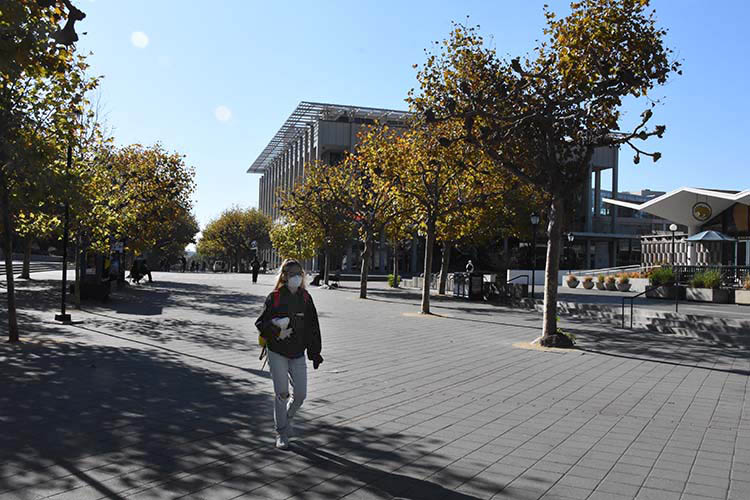What you need to know about smoky conditions on campus
Campus leaders encourage everyone to stay indoors to the extent possible

October 28, 2019
Patrick Goff, head of Environment, Health and Safety, Anna Harte, Berkeley’s medical director and Alicia Johnson, director of the campus Office of Emergency Management sent the following message to the campus community Monday morning. It was updated at 12:31 p.m. to reflect the latest air quality information.
UC Berkeley has been monitoring the air quality impacting the campus. The air quality index (AQI) is currently below 150, which is the level when air is considered “unhealthy.” We encourage everyone to stay indoors to the extent possible and monitor Berkeley News for the latest information.
For information on potential health impacts, protective actions and other resources, please visit our Wildfire Smoke and Air Quality resource page.
While the campus is closed today, some employees are at work and those who work outdoors and in buildings without filtration systems, which help improve indoor air quality, may voluntarily use N95 masks. If the air quality rises to unhealthy levels today, Environment, Health & Safety is handing out N95 masks in the lobby of University Hall until 5 p.m.. The lobby can be accessed at the corner of University Ave and Oxford St.
For employees who must work after 5 p.m. in buildings without filtration or in outdoor areas, supervisors are asked to survey their staff and proactively pick up N95s for them.
For students, University Health Services (UHS) has a limited supply of N95 respirators for use in emergencies including but not limited to wildfires, which are reserved for those most in need. Students with asthma and other underlying medical conditions that put them at high risk of adverse effects and who are experiencing symptoms related to air quality can be assessed, treated, and receive respirators at UHS. Please see the Air Quality Resource page for updated information.
Please remember that the only way to completely avoid potential health risks from both chemicals and particulates found in smoke is to avoid exposure. Stay indoors if you can, and if must be active outside in smoky areas, take steps to limit your time and level of activity outdoors. While N95 masks provide limited particulate filtration and comfort for those sensitive to the smoke, they do not filter harmful chemicals found in smoke and are proven to provide protection only if individually fitted by a trained technician.
For more information on campus actions and protocols based on AQI, please refer to the recent Cal Message on preparing for wildfire smoke.
If you have any questions, please contact your supervisor or Environment, Health and Safety at [email protected].
As always please continue to monitor Berkeley News and UC Berkeley’s Twitter account for the latest updates.
Thank you for your cooperation.